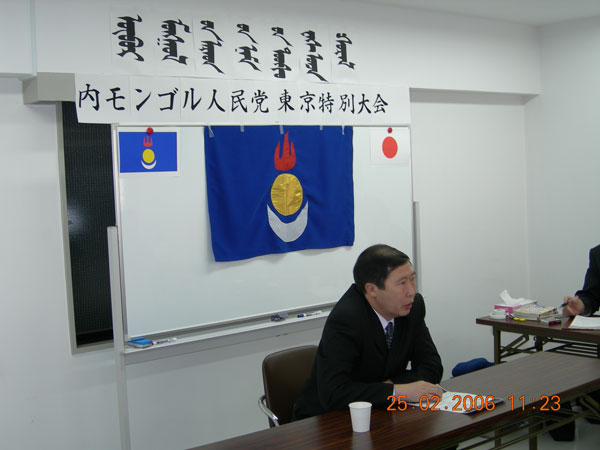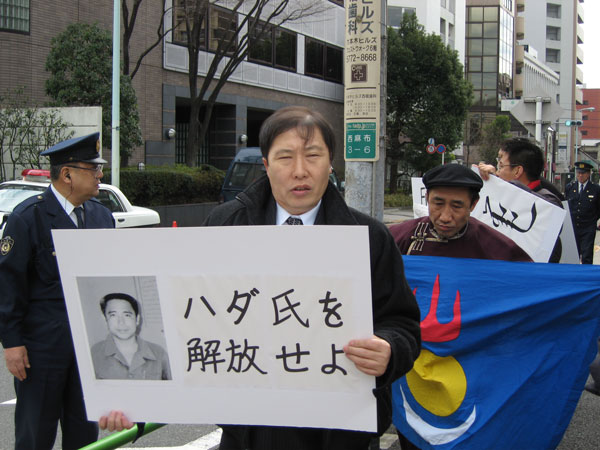| |
| SMHRIC |
|
Feb 27, 2008 |
| New York |
 |
|
| Soyolt at Inner Mongolian
People's Party meeting in Tokyo. Feb 25, 2006 |
|
 |
|
| Soyolt, calling for Hada's
release in Tokyo, 2006 |
|
Jiranbayariin Soyolt, a Southern (Inner) Mongolian dissident in
exile and a citizen of Mongolia, was arrested in Beijing Capital
Airport on January 6, 2008, while on a business trip to China
along with two other Mongolian citizens Mr. Purevsuren,
President of Mon-Energeo HHK, and Mr. Bat-Erdene, partner of
Purevsuren. The three left Ulaanbaatar, capital of Mongolia, on
January 6, 11:45 AM, with Air China airline and arrived at the
Beijing Capital Airport on January 6, 1:00 PM.
According
to a written communication to SMHRIC by Ms. Tuyaa, wife of
Soyolt, Purevsuren and Bat-Erden entered the airport customs
check followed by Soyolt. After waiting for Soyolt outside the
customs check for two hours, Purevsuren and Bat-Erden returned
to the customs counter to inquire about the reason for Soyolt’s
delay. At the customs counter, they saw Soyolt in handcuffs
surrounded by 5 policemen. Upon seeing them, Soyolt told them
that he has been arrested by the Chinese police and asked them
to contact his family and the Mongolian Embassy in Beijing
immediately on his behalf. Purevsuren contacted Soyolt’s family
immediately to inform the family members of what had happened to
Soyolt in Beijing.
Soyolt’s
family members in Ulaanbaatar immediately sent an appeal to the
Ministry of Foreign Affairs of Mongolia calling for Soyolt’s
immediate release. The Ministry acted promptly to contact the
Chinese authorities and assigned Soyolt’s case to its foreign
affairs officer, Mr. Boldoo. Since the arrest, Soyolt’s family
has been in frequent contact with the foreign affairs office.
On January
11, according to Tuyaa, Soyolt was forced by the Chinese
authorities to contact Purevsuren by telephone from Beijing to
tell him that he is still being held in Beijing for “some issue”
with his passport, and asked Purevsuren and others not to reveal
anything about his arrest to any foreign news media in order not
to “make things worse”. Under this threat, family members and
friends of Soyolt have kept quiet and waited for his release
until fairly recently. However, a series of official notes and
requests by the Mongolian Government regarding the case have
been completely ignored by the Chinese Government.
Soyolt’s
wife, Ms. Tuyaa accompanied by Mr. Purevsuren traveled to
Beijing on January 28, and met with officials of the Embassy of
Mongolia to Beijing. On January 31, on behalf of Soyolt’s family
members, Mr. Badamnyambuu, director of the Consular Office of
the Embassy, and Purevsuren visited Public Security authorities
in Beijing and met with a top official there to express their
concern on Soyolt’s case. The Beijing Public Security
authorities confirmed that Soyolt did enter China through
Beijing Capital Airport on January 6, 2008 even though they had
previously repeatedly denied any knowledge of Soyolt’s
whereabouts.
SMHRIC has
contacted the Consular Office director Badamnyambuu in Beijing
however he declined to provide any information on the case,
stating that “it is inappropriate for me to explain it over the
phone”. SMHRIC also contacted the Beijing Airport Security
Department and the Custom Check Office over the phone. All
refused to provide any information on the case.
Jiranbayariin Soyolt, a long-term dissident, human rights
activist and one of the founding members of several exiled
groups based in Mongolia, was born in central Southern
Mongolia’s Shiliin-gol League. He was one of the leaders of the
1981 Mongolian Student Movement, a mass protest by ethnic
Mongolian students and intellectuals against the Chinese Central
Government’s plan for migrating 600,000 Hans into Southern
Mongolia without any consultation with local Mongols. In 1992,
he went into exile in the independent country of Mongolia and
continued his human rights activities, criticizing the Chinese
Government’s ethnic policy and defending the human rights of the
Mongols in China. In 1993, Soyolt attended the World Mongolian
Alliance First Congress in Ulaanbaatar, Mongolia, and gave a
speech publicly criticizing China’s gross human rights
violations in Southern Mongolia and called the Chinese ethnic
policy as “a policy of ethnic cleansing and cultural genocide”.
Later he was granted political asylum in Mongolia, and in1997 he
was granted citizenship of Mongolia under the Naturalization Act
of Mongolia.
China’s State Security internal document entitled “Overview of
Inner Mongolian Separatist Organizations Abroad” ( available at
SMHRIC website at:
http://www.smhric.org/news_39.htm
) listed him as the founder and leader of the Ulaanbaatar Branch
of the Inner Mongolian People’s Party, an exiled group
advocating the independence of Southern Mongolia, and the
Secretary General of the “Association of the World Mongolian
Revitalization Movement” whose constitution, according to the
document, is “to unite with Tibetan and Uyghur youth and ally
with Han-Chinese democratic parties and individuals to create a
multi-lateral coalition to overthrow the regime of the communist
party and to achieve the unification of the Mongol nationality,
ultimately to found the ‘Pacific Eastern Great Mongol Empire’
where the sun never sets.”
More
information on his background and recent case development can be
obtained from the following contacts:
Ms. Tuyaa,
wife of Soyolt:
Tel:
00976-1132-5376 or 00976-8819-8067 (speaks Mongolian only)
Ms. Sarnaa,
daughter of Soyolt:
Tel:
00976-9982-2276 (speaks Mongolian and some English)
Mr.
Tumen-ulzii, friend of Soyolt:
Tel:
00976-9998-5536 (speaks Mongolian and Chinese)
Mr.
Badamnyambuu, director of Consular Office of the Embassy of
Mongolia to Beijing:
Tel:
0086-133-6621-6660 (speaks Mongolian and possibly Chinese)
Mr. Boldoo,
foreign affairs officer who handles Soyolt’s case:
Tel:
00976-5126-2319 (speaks Mongolian and possibly English)
More
phone numbers of the Embassy of Mongolia to Beijing can be
obtained here:
http://www.mongolembassychina.org/index.php?module=content&pid=105
|





